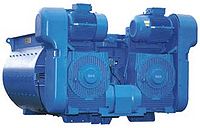Difference between revisions of "Twin Shaft Batch Mixers"
Jump to navigation
Jump to search
(Created page with "Category:Mixing{{Knoppen}} <noinclude><!------------------------------------------------ * READ THIS FIRST * Only edit this page if you can improve the content. * Improper u...") |
PurplePen19 (talk | contribs) |
||
| Line 7: | Line 7: | ||
* Please start editing this page after the /noinclude | * Please start editing this page after the /noinclude | ||
* -------------------------------------------------></noinclude> | * -------------------------------------------------></noinclude> | ||
This | [[File:twin-shaft batch mixer1.jpg|thumb|200px|right|twin-shaft batch mixer]] | ||
The '''twin-shaft batch mixer''' has become a preferred technology for concrete production in many countries. This mixer is used to replace manual mixing with a shovel in which a line of aggregate, cement, and water positioned on the ground, was repeatedly shoveled from right to left. This concept was later abandoned and over a number of development stages, was replaced by today’s highly dynamic movement process. | |||
==Operation Principles== | |||
*Generation of a circular three-dimensional movement of the whole mixture | |||
*Intensive material exchange in the turbulent overlap area of the two mixing circles | |||
*Optimal utilization of the energy input into intensive relative movements of the mixture | |||
*Inclusion of the whole material volume in the mixing process at any time of the process | |||
==Advantages== | |||
===Consistent high level of homogeneous mixture within rapid mix cycles=== | |||
*Homogeneous mixture levels of 95% are achievable within 30 seconds | |||
*Batch after batch the mixers produce high level uniform and homogeneous mixtures | |||
*The mixing techniques preserve the grain structure of the individual recipe components | |||
===High energy efficiency=== | |||
*High mixture performance is achieved at low speeds | |||
*Reduced energy consumption due to short mixing cycles, effectiveness of mixing tools and efficiency of drive units | |||
===Low-wear=== | |||
*Minimal wear of mixing tools and trough liners achieved from relatively low mixing speed and mixer compact design | |||
*Reduced wear compared to pan or planetary mixers | |||
*All wear parts have been optimized and designed for longevity | |||
===Efficient concrete production=== | |||
*Fast and optimal use of cement and other binders | |||
*Potential for saving of cement and other binders | |||
*Consistent and fast distribution of additives and admixtures throughout the whole mixture volume | |||
*Batch to batch consistency for every mixing cycle | |||
*Minimum batch filling levels of 10% are possible | |||
*Guranteed future-proof in view of new concrete recipes (SCC, UHPC, etc.) | |||
*Hybrid mixing cycles possible (slow – fast – slow) | |||
==Video== | |||
<youtube>BxVpH4ZPHCU</youtube> | |||
Latest revision as of 01:46, 3 September 2012
The twin-shaft batch mixer has become a preferred technology for concrete production in many countries. This mixer is used to replace manual mixing with a shovel in which a line of aggregate, cement, and water positioned on the ground, was repeatedly shoveled from right to left. This concept was later abandoned and over a number of development stages, was replaced by today’s highly dynamic movement process.
Operation Principles
- Generation of a circular three-dimensional movement of the whole mixture
- Intensive material exchange in the turbulent overlap area of the two mixing circles
- Optimal utilization of the energy input into intensive relative movements of the mixture
- Inclusion of the whole material volume in the mixing process at any time of the process
Advantages
Consistent high level of homogeneous mixture within rapid mix cycles
- Homogeneous mixture levels of 95% are achievable within 30 seconds
- Batch after batch the mixers produce high level uniform and homogeneous mixtures
- The mixing techniques preserve the grain structure of the individual recipe components
High energy efficiency
- High mixture performance is achieved at low speeds
- Reduced energy consumption due to short mixing cycles, effectiveness of mixing tools and efficiency of drive units
Low-wear
- Minimal wear of mixing tools and trough liners achieved from relatively low mixing speed and mixer compact design
- Reduced wear compared to pan or planetary mixers
- All wear parts have been optimized and designed for longevity
Efficient concrete production
- Fast and optimal use of cement and other binders
- Potential for saving of cement and other binders
- Consistent and fast distribution of additives and admixtures throughout the whole mixture volume
- Batch to batch consistency for every mixing cycle
- Minimum batch filling levels of 10% are possible
- Guranteed future-proof in view of new concrete recipes (SCC, UHPC, etc.)
- Hybrid mixing cycles possible (slow – fast – slow)
Video
